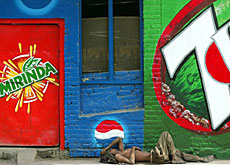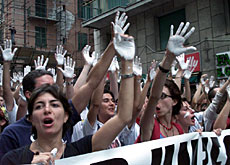Summit reopens old divisions

The World Summit on the Information Society (WSIS) in Geneva aims to lay the foundation for a more just and equal global society.
But this is not the first time the United Nations has brought world leaders together to address the disparities between rich and poor countries.
Over the past ten years, the UN has organised similar meetings around the world, seemingly without huge results.
“The WSIS is a global summit which will put back on the table a number of the contentious issues that have been addressed in recent years,” said Alain Modoux, an advisor to the Swiss government and a former UN official.
Decade of discussions
As the Cold War drew to a close at the end of the 1980s, the ideological confrontation between East and West gave way to a new vision for world order based on market economies and democracy.
Wanting to play a role in defining this vision, the UN stepped up its efforts to build a more peaceful world by inviting heads of state and governments to a variety of conferences – from the Rio Summit on the Environment and Sustainable Development to the Durban conference on racism.
They also met in Cairo to talk about natural resources, Vienna to discuss human rights, Istanbul to debate the habitat, Copenhagen to tackle poverty and in Beijing for a forum on women’s rights.
And at the dawn of the new millennium, the UN General Assembly gathered in September 2000 to draw up a set of aims known as the Millennium Development Goals, which encompass a large number of the objectives set out during previous conferences.
The aim of that declaration was to reduce poverty and improve education and health for disadvantaged populations across the globe.
Mixed results
All of these meetings allowed world leaders to address a constantly changing world and to include issues such as sustainable development in the global political agenda.
But because of a lack of enforcement mechanisms, few of the political declarations and action plans they came up with have materialised.
UN statistics show that economic and social disparities have decreased only slightly in recent years. Non-governmental organisations (NGOs) argue that the inequalities between rich and poor have actually become worse.
Meanwhile, the anti-globalisation movement has grown more vocal, with protesters taking their arguments to the streets during UN summits.
New partnerships
Having learned a few lessons the hard way in recent years, the UN now hopes that the WSIS in Geneva will usher in a new era of international exchange.
According to the event’s president, Adama Samasséko, this “summit of summits” is intended to boost efforts to fulfil the Millennium Development Goals.
And in order to do so, the UN has come up with a new formula for negotiations – one that involves not only governments, but also representatives of civil society, the private sector and international organisations.
They also decided to split the summit in half, with a second round of talks scheduled to take place in Tunisia in 2005, where delegates will be able to assess the progress of decisions taken during the Geneva phase of the summit.
Pushing for success
For Samassékou, it is imperative that the summit should end in success, rather than in stalemate.
“This summit gives us an historic opportunity to tackle the principal problems that threaten our planet,” he said.
“The UN system is in crisis, the economy is being stifled, and violence and insecurity are growing,” he added. “We cannot close our eyes and carry on like this.”
swissinfo, Frédéric Burnand in Geneva (Translation: Anna Nelson)
Since the end of the Cold War, the United Nations has been trying to build a more just and peaceful world.
This vision is summed up in the Millennium Development Goals, which outline eight specific objectives for dealing with the world’s most serious problems.
The World Summit on the Information Society aims to facilitate the realisation of these goals, which include eradicating poverty, achieving primary universal education and reducing child mortality by 2015.

In compliance with the JTI standards
More: SWI swissinfo.ch certified by the Journalism Trust Initiative



You can find an overview of ongoing debates with our journalists here. Please join us!
If you want to start a conversation about a topic raised in this article or want to report factual errors, email us at english@swissinfo.ch.